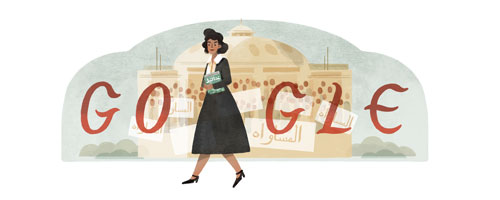
Doria Shafik (Arabic: درية شفيق;14 December 1908 – 20 September 1975) was a feminist, poet and editor, and one of the principal leaders of the women's liberation movement in Egypt in the mid-1940s.[1] As a direct result of her efforts, Egyptian women were granted the right to vote by the Egyptian constitution.
Shafik was born in Tanta, in the Nile Delta of Northern Egypt and studied in a French mission school. At the age of 16 she became the youngest Egyptian to earn the French Baccalaureate degree. At 19 she was awarded a scholarship by the Egyptian Ministry of Education to study at the Sorbonne University in Paris. She also studied for a PhD in philosophy at the Sorbonne.[2] She wrote two thesis, one refuting the merely utilitarian ends generally associated with Ancient Egyptian art, and the second, arguing that Islam amply recognised women's equal rights. She was awarded her PhD (Doctorat d'Etat) with high qualifications (Mention très honorable).
While in Paris, Shafik married Nour Al Din Ragai, a law student who was also on scholarship and working on his PhD.
Upon her return from France to Egypt in 1940, Shafik hoped to contribute to the education of her country's youth, but the dean of the Faculty of Literature of Cairo University denied her a teaching position on the pretext that she was "too modern."[2]
In 1945, Princess Chevicar, the first wife of Egypt's then former King Fuad I, offered Shafik the position of editor-in-chief of La Femme Nouvelle, a French cultural and literary magazine addressing the country's elite. Shafik accepted the position, and with Chevicar's death in 1947, took complete responsibility for the magazine, including its financing. Under her direction La Femme Nouvelle gained regional status. Also in 1945, Shafik decided to publish an Arabic magazine (Bint Al Nil or Daughter of The Nile) intended to educate Egyptian women and to help them to have the most effective role possible within their family and their society.[3]The first issue came out in November 1945 and was almost immediately sold out.
In 1948 Shafik created the Bint Al Nil Union, to help solve women's primary social problems and to ensure their inclusion in their country's policies.[4] The union also worked to eradicate illiteracy by setting up centres for that purpose throughout the country, set up an employment office and a cafeteria for working women.
Comments
Post a Comment